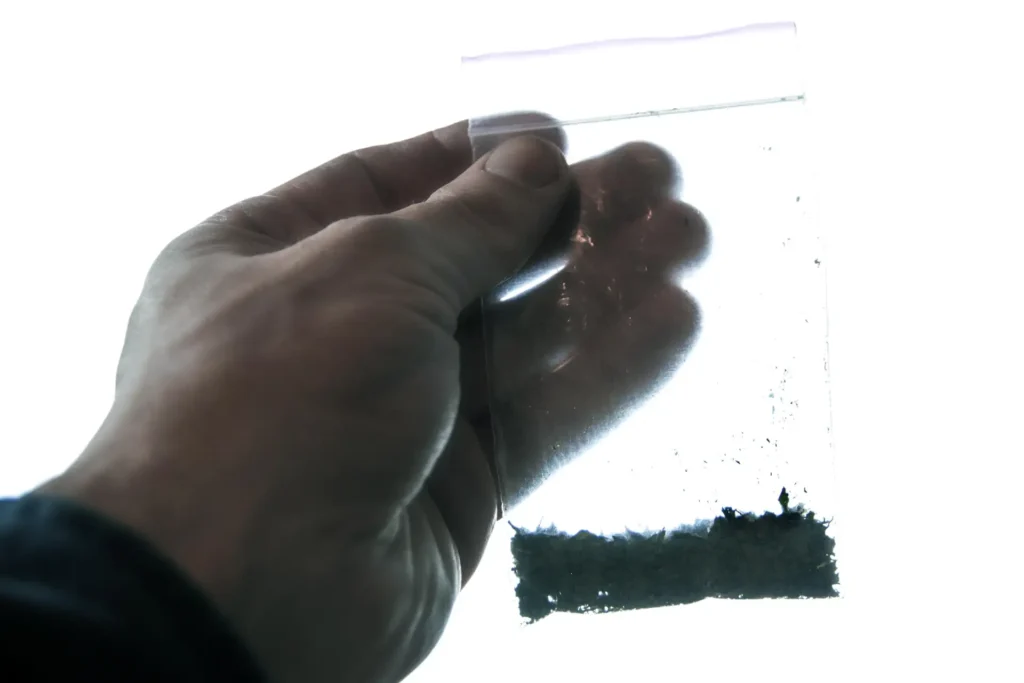Spice, also called synthetic marijuana, is a plant blend treated with chemicals to mimic THC, the active ingredient in cannabis. Marketed as safe, it often results in severe health risks and unpredictable effects. This article explains what Spice is, the dangers involved, and how to reduce these risks.
Key Takeaways
- Spice is a synthetic cannabinoid that mimics THC and poses significant health risks, including addiction and severe psychological effects.
- Addiction to Spice is fueled by its accessibility and perceived safety, particularly among individuals with pre-existing mental health conditions.
- Turning Point of Tampa provides comprehensive treatment for Spice addiction, emphasizing individualized care through detoxification, residential treatment, and ongoing support.
What is Spice?

When a person speaks about spice, most think they are referring to flavor and taste like fresh herbs, black pepper, salt, cinnamon, and even fresh ginger. A blend of taste from all over the world like the Middle East, India, Asia, Morocco, Mexico, and our local region here in the United States. A mix of dishes that create a fabulous meal. A table full of food for each season. Arromas like coriander, cloves, and turmeric. No preservatives so your pallette and your health can love ingredients that matter.
Spice is Also Known as Synthetic Cannabinoids
This spice, also known as synthetic cannabinoids or synthetic marijuana is what this article is referring. Spice consists of dried plants treated with chemicals designed to mimic the effects of THC, the active ingredient in natural marijuana. It is marketed under various names, including K2 and Spice, among many others. These products are often sold in places like gas stations, vape shops, and online stores, making them easily accessible to a wide range of consumers. The packaging is typically colorful and attractive, designed to lure in buyers who may not be fully aware of the potential dangers.
Despite its appealing presentation, Spice is far from a natural or safe product. It is a concoction of herbs and chemicals that are literally designed to have a powerful effect on the brain, often much stronger than that of natural cannabis. The history of synthetic cannabinoids dates back to research laboratories where they were initially developed for legitimate scientific studies. However, their misuse has led to a host of health issues and addiction problems worldwide.
The effects of Spice can be unpredictable and dangerous. Users may experience heightened anxiety, paranoia, and a range of other adverse effects. The lack of regulation and quality control means that the potency and composition of these products can vary greatly, increasing the risk of serious health consequences.
Recognizing what Spice is and its inherent risks helps in understanding the importance of avoiding its use and seeking help when needed.
Reducing the Risks
Although avoiding synthetic cannabinoids entirely is recommended due to their potency and risks, some may still experiment with them. Being aware of harm reduction strategies is best for these individuals. Beginning with a very small dose, no larger than a match head, can mitigate some immediate dangers. Allowing at least an hour between doses can also reduce the risk of overdose.
Using Spice in a safe environment with trusted individuals is also important. Severe anxiety and paranoia are possible effects, making it best to be in a setting where help is available if needed. Individuals with pre-existing mental health conditions, like anxiety or depression, should avoid these substances as they can worsen these issues.
Avoid smoking Spice in its pure form and refrain from sharing smoking devices to maintain hygiene and reduce health risks. The strength and composition of synthetic cannabinoids can vary widely, and using water pipes can lead to deeper inhalation, potentially causing more lung damage.
Despite these precautions, it is essential to recognize that there is no completely safe method for consuming Spice (synthetic cannabinoids). The safest approach is to avoid synthetic cannabinoids entirely.
Spice Addiction & Abuse

Spice addiction is a serious and growing problem, characterized by a compulsive need to use the substance despite negative health, social, and financial consequences. Synthetic marijuana, known as Spice or K2, is promoted as a legal substitute for natural marijuana, but its use can quickly spiral out of control, leading to addiction and abuse.
Addiction develops when the urge to use Spice becomes overwhelming, overshadowing awareness of its harmful effects. Severe health issues, including altered brain functions related to emotions and decision-making, can result from this addiction. Easy accessibility and perceived safety due to its legal status contribute to widespread abuse. Its lower cost compared to natural marijuana and curiosity about new substances can also drive individuals to use Spice.
People with mental health issues, like anxiety and depression, might use synthetic marijuana for self-medication. The addictive nature of Spice can worsen these conditions over time, which is particularly concerning. Recognizing the factors contributing to Spice addiction is essential for developing effective prevention and treatment strategies.
How Spice Addiction Develops
A complex interplay of biological, psychological, and social factors contributes to Spice addiction. Repeated use alters brain functions related to emotions and decision-making, making it increasingly difficult to resist the urge to use Spice. The changes in brain chemistry can lead to a strong compulsion to continue using Spice, despite the negative consequences that may arise.
Several factors contribute to synthetic marijuana abuse, including easy accessibility and perceived safety due to its legal status. Its lower cost compared to natural marijuana makes it an attractive option for those seeking similar effects. Individuals with mental health disorders, such as anxiety and depression, may use Spice for self-medication, further complicating their mental health.
The potential for addiction to synthetic marijuana is a major concern, leading to physical dependence among users. The legal status and marketing of Spice as a natural product contribute to the false belief that it is a safer alternative to natural marijuana.
Side Effects Of Using Synthetic Marijuana

Side effects of synthetic marijuana, or Spice, range from mild to severe, posing significant health risks. Common side effects include nausea, headaches, and dizziness, but severity can escalate to serious health issues such as heart attacks and even death. The type of synthetic marijuana and the user’s tolerance significantly influence the range and intensity of side effects.
Effects of synthetic marijuana can be highly unpredictable and uncomfortable. Psychotic episodes, severe anxiety, and paranoia can lead to dangerous behavior. Combining Spice with other substances like alcohol or drugs increases the potential for adverse effects and complications. Mind-altering effects of synthetic marijuana are often stronger and more dangerous than those of natural cannabis.
Continued use of synthetic marijuana can lead to addiction and result in serious physical and mental health issues. Unpredictability and potency of these substances make them particularly hazardous. Recognizing the side effects is crucial to understanding the dangers of synthetic marijuana and the importance of seeking help if needed.
Turning Point of Tampa’s Approach to Spice Addiction

Turning Point of Tampa provides a comprehensive approach to treating Spice addiction, focusing on holistic and individualized care. They offer a full range of services, including detox, residential treatment, and outpatient programs, tailored for those struggling with addiction to synthetic marijuana.
The facility combines medical care, therapy, and support services to mix address the complex needs of individuals battling Spice addiction. Specialized programs for clients with synthetic marijuana addiction ensure each individual receives the care and attention needed for successful recovery.
Their commitment to comprehensive recovery strategies distinguishes them in the field of addiction treatment.
Inpatient Medically Supervised Detox
The medically supervised detox program at Turning Point of Tampa is designed to safely manage withdrawal symptoms and reduce cravings with professional care. The program provides 24-hour medical supervision, ensuring patients are safe and comfortable during withdrawal. The goal is to create a secure environment for detoxifying from synthetic marijuana under the guidance of experienced medical professionals.
Detoxification is a critical first step in recovery. 24/7 medical supervision mitigates withdrawal risks and provides immediate support for complications. This care level is essential for individuals dependent on synthetic marijuana, as withdrawal symptoms can be severe and dangerous.
Residential Treatment Programs
Turning Point of Tampa’s residential treatment programs offer a structured environment supporting recovery and personal growth. The Primary Care program focuses on initial treatment, providing a safe and supportive setting for beginning recovery. This program helps clients develop healthy coping skills and address underlying issues related to their addiction.
Extended Care offers ongoing support and recovery after the initial treatment phase, allowing clients to continue healing in a structured environment. This program aims to set clients up for success as they transition back into the outside world, ensuring they have the tools and support to maintain sobriety.
Both the Primary and Extended Care programs offer individualized therapy tailored to each client’s needs, ensuring a personalized approach to recovery.
Intensive Outpatient Program (IOP)
The Intensive Outpatient Program (IOP) at Turning Point of Tampa is designed for individuals needing support in their recovery while managing daily responsibilities. The program offers flexible scheduling, allowing participants to maintain personal and professional lives while receiving ongoing therapeutic support. The IOP meets three evenings a week, balancing treatment and everyday responsibilities.
The IOP empowers individuals to commit to recovery without compromising daily routines. With a flexible treatment structure, participants receive essential therapeutic support while continuing to work, attend school, or fulfill family obligations. This approach ensures individuals can integrate recovery into everyday lives, promoting long-term success and stability.
Support Systems and Aftercare

Support systems and aftercare are crucial components of recovery. Aftercare sustains gains made during treatment and prevents relapse by providing ongoing support and resources. Developing an aftercare plan before completing treatment helps individuals anticipate challenges and reduce relapse risk.
Family and friends play a vital role in post-recovery support by celebrating milestones and encouraging fresh healthy habits. Sober living homes provide a drug-free environment supporting individuals in maintaining sobriety.
Engaging in structured continuing care programs, such as outpatient therapy, helps individuals cope with post-treatment challenges and build a supportive community, key for long-term sobriety.
Summary
Understanding the dangers of Spice and the importance of comprehensive treatment is crucial in addressing this growing issue. Synthetic cannabinoids pose significant health risks, and their addictive nature can lead to severe physical and mental health problems. Adverse effects of synthetic cannabinoids include tachycardia, elevated blood pressure, and hallucinations. Turning Point of Tampa offers a holistic approach to treating Spice addiction, providing a range of services tailored to individual needs.
By focusing on medically supervised detox, residential treatment, and intensive outpatient programs, Turning Point of Tampa ensures that each individual receives the care and support they need to achieve lasting recovery. Support systems and aftercare play a vital role in sustaining these gains, helping individuals maintain their sobriety and build a healthier future.
Frequently Asked Questions
What are synthetic cannabinoids like Spice?
Synthetic cannabinoids like Spice are designer drugs that imitate the effects of natural cannabis but carry serious health risks. They are often falsely marketed as safe, legal alternatives to marijuana.
How can one reduce the risks associated with using synthetic cannabinoids?
To reduce the risks associated with synthetic cannabinoids, don’t use them. The adverse health effects of synthetic cannabinoids can be long-lasting even after quitting the substances.
What makes Spice addictive?
Spice is addictive because repeated use changes brain functions linked to emotions and decision-making, creating an overwhelming urge that can lead to dependency. Synthetic cannabinoids can be sprayed or mixed on plant material for smoking. This signifies a significant alteration in one’s mental state and behavior. State public health and poison centers have issued warnings about the health effects of synthetic cannabinoids.
What side effects can result from using synthetic marijuana?
Synthetic marijuana can lead to side effects that include nausea, headaches, heart attacks, and psychotic episodes, resulting in significant health risks. It is crucial to consider these potential dangers when contemplating its use.
What kind of treatment programs does Turning Point of Tampa offer for Spice addiction?
Turning Point of Tampa provides comprehensive treatment programs for Spice addiction, including medically supervised detox, residential treatment, and intensive outpatient programs tailored to individual needs. This approach ensures that clients receive the appropriate support for their recovery.
Sources:
https://en.wikipedia.org/wiki/Synthetic_cannabinoids

